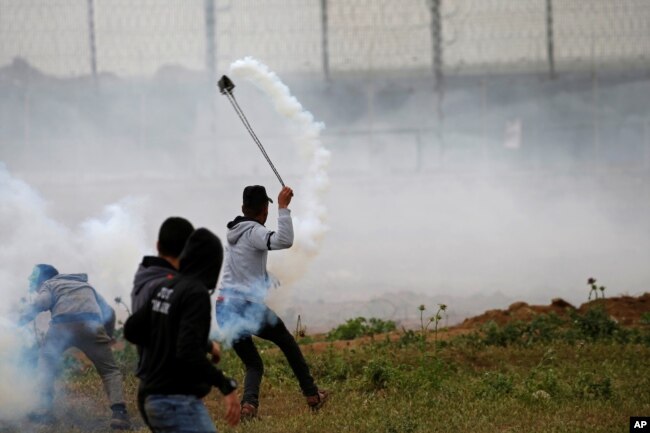Thousands of Palestinians rallied at the Gaza-Israel border on Saturday to mark the first anniversary of a surge of protests, facing off against Israeli forces massed across the frontier, VOA news reports.
Troops fired tear gas across the border and the Israeli military said some of the estimated 20,000 demonstrators threw rocks, grenades and burning tires towards them.
Palestinian activists clad in bright orange vests tried to keep people back, though some made it to the fence.
Gaza medics said that one Palestinian man was killed by Israeli fire before dawn on Saturday near the boundary. The Israeli military said it had no knowledge of the death and that Palestinians were throwing explosive devices at the border fence through Friday night.
Confrontations have mounted this week ahead of the commemoration of the ‘Great March of Return’ protests, which began on March 30 2018. A Gaza rocket attack wounded seven Israelis north of Tel Aviv on Monday and, in response, Israel launched a wave of air strikes and ramped up its forces at the border.
The protests have turned deadly in the past and Egyptian mediators were working to avoid further bloodshed and ease Israeli restrictions on Gaza. Leaders of Gazan armed groups Hamas and Islamic Jihad said that progress had been made in the truce talks.
Security has been a prominent issue in the build-up to Israeli elections due on April and, Prime Minister Benjamin Netanyahu’s handling of Gaza will be a key issue as he seeks a fifth term in office.
The protests call for the lifting of a security blockade imposed by Israel and Egypt, and for Palestinians to have the right to return to land from which their families fled or were forced to flee during Israel’s founding in 1948. Israel rejects that demand saying that would eliminate its Jewish majority.
March 30 also marks “Land Day”, an annual commemoration of the deaths of six Arab citizens of Israel killed by Israeli security forces during demonstrations over government land confiscations in northern Israel in 1976.
Lethal force
Loudspeakers on the Gaza side of the border blasted national songs and medical field units were set up in case of injuries as Gazans flowed to the various protest sites under heavy rain.
The Gaza Education Ministry shut schools to encourage participation.
“In a year I will finish school, my father is unemployed so I will be unable to go to university, who is responsible? Israel,” said 16-year-old Mohammed Ali. “I don’t know how many years will pass before our lives improve but we should continue (protests) as long as the occupation and the blockade exist.”
More than 2 million Palestinians are packed into the Gaza Strip, a narrow coastal enclave where poverty and unemployment rates are high. The Islamist Hamas group rules the territory and has fought three wars with Israel in the past decade.
The blockade is cited by humanitarian agencies as a key reason for impoverishment in Gaza.
Israel seized Gaza in a 1967 war and pulled out its troops in 2005. The security blockade, it says, is necessary in order to stop weapons from reaching Hamas and other armed groups which have fired thousands of rockets into Israel.
The border protests have turned into a standoff between Gazans hurling rocks and explosives and Israeli troops across the border. Palestinians have also launched incendiary balloons and kites into Israel and breached the Israeli frontier fence.
About 200 Gazans have been killed by Israeli troops since the protests started, according to Palestinian Health Ministry figures, and an Israeli soldier was killed by a Palestinian sniper.
Israel’s use of lethal force has drawn censure from the United Nations and rights groups. U.N. investigators said last week that Israeli forces may be guilty of war crimes for using excessive force.
Israel says it has no choice but to use deadly force at the protests to prevent militants from breaching the border fence and attacking civilian communities in the area.

